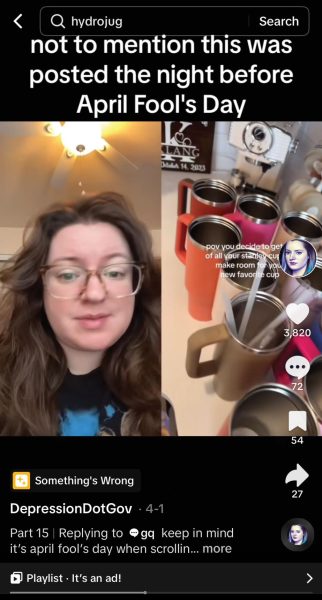‘Run! Don’t walk! Must haves! Now 50% off in the TikTok shop! This deal won’t last long!’
From skincare to Scrub Daddy sponges, it seems consumerism is practically inescapable on social media. As self-described influencers shamelessly promote some new useless product to poor unsuspecting scrollers, I can’t help but wonder the impact this blatant overconsumption is having on our mental health, society and environment.
I am not the only social media consumer annoyed by this constant barrage of useless products. The era of de-influencing seems to be upon us as consumers are getting weary of the incessant promotion of products.
One of the biggest de-influencers on TikTok is a 30-year-old named Diana whose TikTok handle is @depressiondotgov.

With almost 200,000 followers, she stitches videos of other creators as they buy hundreds of dollars worth of Valentine’s Day decor in Target, useless accessories for their Stanley water bottles or “restock” mini-makeup fridges among other videos.
She has dubbed her followers the “garbitches” and emphasizes the uselessness of products some influencers showcase by creating “garbage haul” playlists.
As Diana points out, the reality is a $600 Dyson Airwrap will not change someone’s life. People do not need a snack tray for their Stanley. And the Target dollar section is a waste of money – you know you probably don’t need a small sparkly pink gnome for Valentine’s Day anyway.
While buying something can make a person happy for a short period of time, it does not create long-term happiness and fulfillment. Research has shown that when people orient their lives around buying the trendiest new product, they report “greater unhappiness in relationships, poorer moods and more psychological problems.”
Additionally, our overconsumption is inevitably leading our planet down a path of environmental destruction.
According to a U.N. panel that studies global natural resources, consumption is the leading driver of our environmental problems around the world.
Environmental journalist J.B. MacKinnon highlighted this dire situation in a recent interview with NPR.
“Consumption is the leading driver of our environmental problems around the world today, surpassing even the growth of the human population on the planet,” Mackinnon said. “So you name it, it drives it – deforestation, toxic pollution, climate change, mining, even fisheries, even the extinction of species is tied in tightly to our consumption.”
Industries like fast fashion specifically are key contributors to overconsumption and environmental issues. According to Princeton University, the fashion industry is responsible for more annual carbon emissions than all their international flights and maritime shipping combined. If the industry continues growing like it is today, an increase of 50% greenhouse gas emissions is expected within a decade. Clothing hauls from fast fashion companies like Shein and Zara are often all over TikTok and Instagram, further perpetuating this harmful industry.
While cheap clothes and products may be enticing to purchase, especially as college students, try to steer clear of these harmful industries for your own mental well-being and the planet’s well-being.









